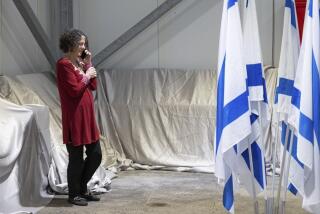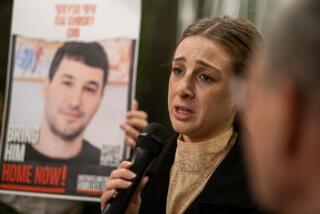Cuban Boy Meets With Grandmothers in Florida
MIAMI BEACH — Elian Gonzalez was reunited with his two Cuban grandmothers here Wednesday in a private hourlong meeting that seemed only to underscore the bitter and highly political battle being waged over the fate of the 6-year-old boy.
“It is very definitely a family affair that has somehow turned into political agendas that it is difficult for us to understand,” said Sister Jeanne O’Laughlin, the Dominican nun and Barry University president who hosted the reunion at her home. “There was pain on both sides, hurt on both sides. The greatest element, however, was that of fear.”
Although the grandmothers reportedly were happy to see the child who left Cuba 65 days ago without telling them goodbye, the meeting does not resolve the international struggle over where Elian will live.
Outside the nun’s house, 200 demonstrators--most of them Cuban exiles opposed to returning Elian to his father in Cuba--waved American and Cuban flags and chanted anti-Castro and anti-Clinton slogans. A few threw flowers in front of the car that brought the Cuban women to the meeting.
A heavy police contingent patrolled streets in the neighborhood and also manned boats on Indian Creek behind the house where the meeting took place.
The grandmothers, Mariela Quintana and Raquel Rodriguez, did not come face to face with the Miami relatives who have been caring for Elian since he arrived here Nov. 25, one of three survivors when a small boat from Cuba capsized and his mother and 10 others drowned.
Meeting ‘Elated’ Grandmothers
But they did get to hug Elian, a child both helped to raise. “When Elian saw his grandmothers, they were elated,” said Sister Eleanor Esnard, a Cuban-born nun who attended the private get-together in an upstairs room of the estate owned by Barry University, a small Roman Catholic school.
“They picked him up, they hugged him. They were shaking. They were thrilled. It was like a sacred moment.”
Sitting around a table, the grandmothers showed Elian pictures of the family in Cuba, as well as drawings, pictures and letters from his schoolmates in his hometown of Cardenas.
Waiting downstairs in the house were Elian’s great-uncle Lazaro Gonzalez, his daughter Marisleysis, a second great-uncle, Delphine Gonzalez, and various lawyers and advisors who have been fighting to prevent U.S. immigration officials from returning the child to his father.
O’Laughlin said that both sides of the divided family refused an invitation to sit down together at a Cuban meal the university staff had prepared. “I think you know the fear and mistrust on both sides,” said O’Laughlin, 70, a community activist who hosted the meeting at the request of her friend, Atty. Gen. Janet Reno.
The grandmothers also had flown to Miami on Monday but returned to Washington when a neutral site for a meeting with Elian could not be arranged.
They did not comment publicly after Wednesday’s meeting. They were taken by helicopter to a waiting airplane that returned them to Washington. They are expected to continue today to lobby legislators in support of the U.S. Immigration and Naturalization Service ruling that the boy should be returned to the custody of his father. Elian’s Miami relatives have challenged that ruling in federal court.
After returning to their Little Havana home Wednesday, many of those relatives and their supporters seemed elated. “I feel great. I feel confident . . . that he’s more to this side than to that side,” said Marisleysis Gonzalez, 21.
Adding to the tension of the meeting at O’Laughlin’s house was the discovery that maternal grandmother Rodriguez was carrying a cell phone in violation of ground rules agreed upon by both sides. O’Laughlin said the phone was confiscated when it rang.
It was unclear who was calling. But in a letter from the boy’s father, Juan Miguel Gonzalez, published Wednesday in Cuba’s state-run newspaper Granma, he told his mother and his mother-in-law that he would call them during the meeting.
In Washington, meanwhile, other Miami relatives of Elian stepped up their appeals in support of legislation introduced earlier this week that would make the child a U.S. citizen or a permanent resident.
At a news conference, two of the boy’s cousins, along with the other two survivors of the boat trip across the Florida Straits, asked federal officials to respect what they said were the mother’s wishes.
Nivaldo Fernandez, one of the survivors, said through a translator that Elizabet Broton, the boy’s mother, said these words before she drowned: “The only thing I am asking you is to make sure [Elian] reaches American soil . . . that Elian reaches a land of liberty.”
Georgina Cid, a second cousin from Miami, said that if Elian is returned to Cuba, “they’re going to destroy him. They’re going to make him a communist symbol.”
Another survivor of the boat trip, Arriane Horta, who left her own 5-year-old daughter in Cuba, said it is “a lie” for people to suggest that Elian’s mother was pressured by her boyfriend, the trip’s organizer, into coming along. “She could have stayed if she wanted to.”
Rodriguez, Elian’s maternal grandmother, has said that her daughter was pressured into the perilous journey.
Some Democrats, meanwhile, continued to voice skepticism about congressional efforts to grant Elian citizenship. “I don’t believe our role . . . is to impose ourselves in a decision that should rightfully be made by [Elian’s] father,” Sen. Dianne Feinstein (D-Calif.) said Wednesday in a speech on the Senate floor.
Elian--who was taken to sea by his mother apparently without the knowledge of his grandmothers or his father--was found adrift on an inner tube. He was placed in the temporary custody of a great-uncle he had met only briefly in June and has become a living icon for many in the staunchly anti-Castro exile community. Elian has been on the cover of Time magazine.
The grandmothers, both 51, left Cuba for the first time on Friday, when they began a whirlwind tour of the United States designed to rally political and popular support for their oft-repeated desire to bring the boy home to his father. They have appeared live on NBC’s “Today” show, Cable News Network and several other television programs.
Although the grandmothers make no secret of their desire to take Elian back to Cuba with them, INS officials made it clear that would not happen Wednesday.
‘Very Touch-and-Go for a Long Time’
The reunion began more than an hour later than the 4 p.m. start ordered by the INS. Elian--dressed in a red and blue-checked shirt and dark pants and wearing a gold chain around his neck--did not arrive at the university-owned villa until after 4:30 p.m., driven to the site in the company of his relatives.
“It was very touch and go for a long time,” said O’Laughlin, referring to the grandmothers’ concerns about security arrangements after they learned that members of the anti-Castro Cuban American National Foundation were monitoring the meeting from the house next door.
O’Laughlin asked foundation members to leave, according to foundation spokeswoman Ninoska Perez and they did.
O’Laughlin said that she showed the Cuban women her house was secure. “No trap doors, only an old woman nun who wanted to love them,” she said.
*
Contributing to this story were staff writers Nick Anderson, Janet Hook and Eric Lichtblau in Washington, Mark Fineman in Havana and researcher Anna M. Virtue in Miami.
More to Read
Sign up for Essential California
The most important California stories and recommendations in your inbox every morning.
You may occasionally receive promotional content from the Los Angeles Times.










